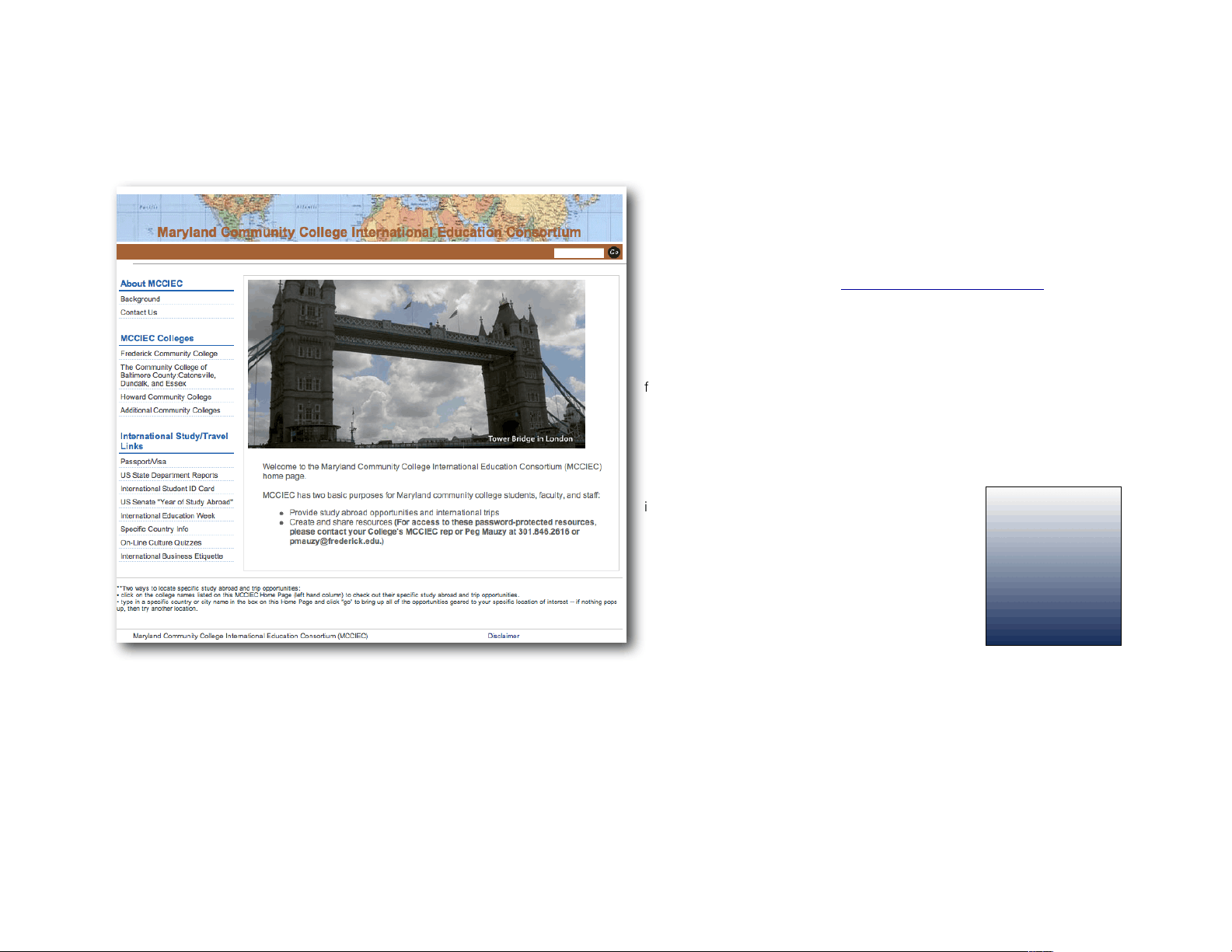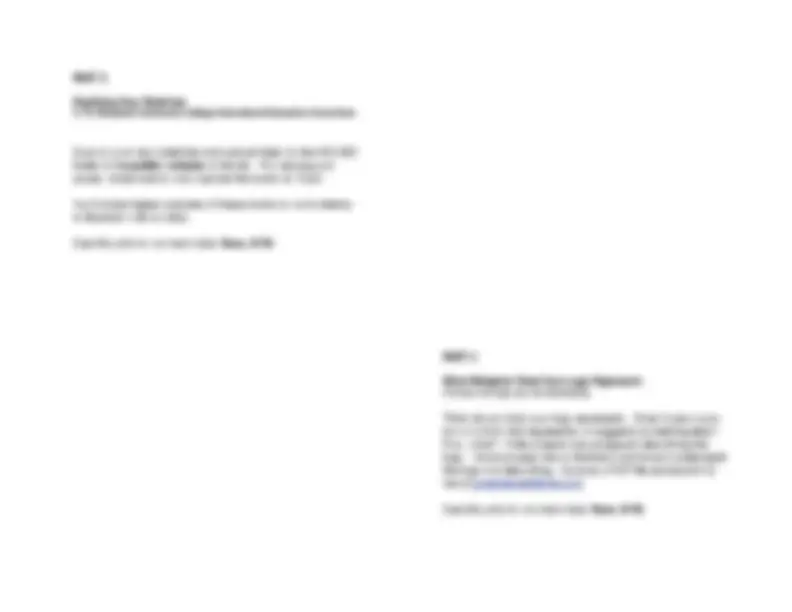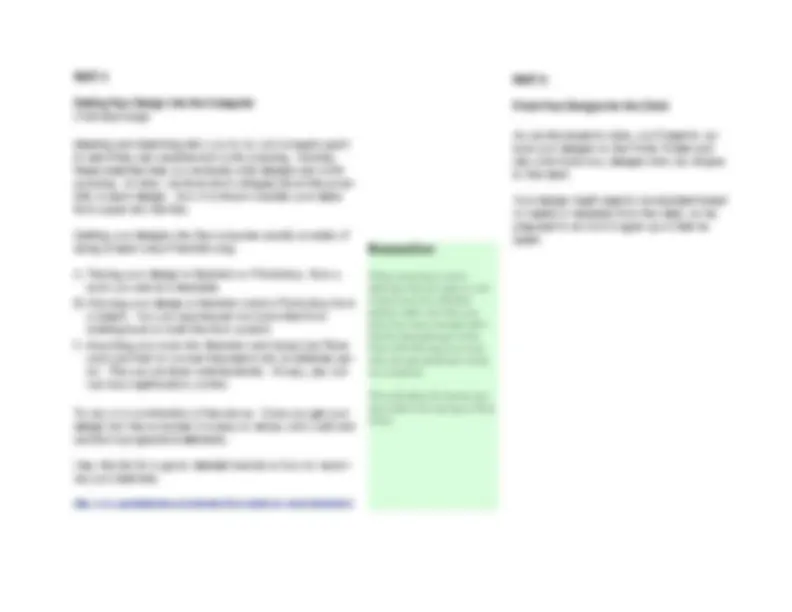




Study with the several resources on Docsity

Earn points by helping other students or get them with a premium plan


Prepare for your exams
Study with the several resources on Docsity

Earn points to download
Earn points by helping other students or get them with a premium plan
Community
Ask the community for help and clear up your study doubts
Discover the best universities in your country according to Docsity users
Free resources
Download our free guides on studying techniques, anxiety management strategies, and thesis advice from Docsity tutors
A graphic design project for the maryland community college international education consortium (mcciec) during the fall 2008 semester, led by professor jones. Students are tasked with developing visual ideas for a new branded identity for mcciec, focusing on strong symbols, graphics, type, and color. They are expected to create 25 sketches, identify three to develop further, and digitize and upload their sketches for critique.
Typology: Study notes
1 / 4

This page cannot be seen from the preview
Don't miss anything!



MCCIEC is an acronym for the Maryland Community College International Education Consortium. You can visit their website, here. http://www.mcciec.org/index.htm They are looking to develop a new branded identity. Read through the website and develop some visual ideas about what the MCCIEC represents. Think of using strong symbols, graphics, type and color. As you can see in the website, the MCCIEC logo runs as a banner across the full width of the page. Is this the intention? Is this a logo? Does it work? What images does the current logoform represent? Sketch your new ideas out on paper and post them on the viewing wall, out- side of Joppa J005 with push pins (use the long ones) by Monday at 10 am. Your sketches should be mainly conceptual–short ideas that address the purposes of the MCCIEC. Find a visual form that represents the mission of this group. Be prepared to talk about your sketches. At a minimum, you should have about 25 sketches. Don’t try to edit yourself out much at this idea stage. Let it rip. Concentrate on developing a graphic form that represents the organization. Do this all by hand. On a letter size piece of paper, print out (with the computer) your name (in a 3” x 9” rectangle). Post your name next to your sketches by the deadline. Look at other organizations that deal with international education and travel. Bring these links or copies of your research to critique on Tuesday 9/9. DUE MONDAY 9/8 BY 10 AM-PUSHPIN TO VIEWING WALL OUTSIDE JOPPA J CRITIQUE TUESDAY 9/9 In Class in the Hallway adjacen to Viewing Wall.
A Harford Community College International Education logo and identity campaign.
for the Maryland Community College International Education Consortium From your 25 sketches, identify (3) that you would like to develop. Make copies (letter size) of your sketch sheets and circle (in red) the three logos you’ll work on–put those sheets in my mailbox by Wed. 9/10. Make at least (5) iterations of each of your chosen sketches. That’ll be (15) total pen/ink/pencil on paper sketches. Keep them still in B+W line drawing mode. Your iterations should be significantly different from one an- other, not just in scale or orientation, but in content and style. Digitize your paper sketches, then can just be full page scans, (scan at 72ppi) and upload them to the MCCIEC logo folder on the public folder in the lab. Due this prior to our next class Tues. 9/
The intitial idea of the arrow sketch above in B+W, was born from a brief exposure to a very poor powerpoint presentation. During this presenta- tion, I kept seeing arrows, and I be- gan to think about the value of trav- el–how travel provides an experience that you not only have abroad, but that you bring back with you. The “Leave, Come Back Twice” slogan came first, then I used the arrows to visually represent the concept and began to sketch out different versions of the idea.
3 Individual Design Ideating and sketching allow you to try out concepts quick to see if they are valuable and worth pursuing. Sharing these sketches help you evaluate what designs are worth pursuing. In class, we have short critiques about the possi- bility in each design. Now it is time to transfer your ideas from paper into the Mac. Getting your designs into the computer usually consists of doing at least one of the following: A. Tracing your design in Illustrator or Photoshop, from a scan you use as a template. B. Drawing your design in Illustrator and/or Photoshop from a sketch. You can use the pen tool and other form building tools to build this from scratch. C. Importing your scan into Illustrator and using Live Trace and Live Paint to convert the sketch into an editable vec- tor. This can produce variable results. It’s eay, yes, but can be a nightmare to control. Try any or a combination of the above. Once you get your design into the computer, it is easy to resize, color, add and subtract typographical elements. View this link for a good, detailed tutorial on how to vector- ize your sketches: http://www.gomediazine.com/tutorials/from-sketch-to-vector-illustration/
When scanning in your sketches that you plan to vec- torize (turn into editable paths), make sure that you give your scan enough infor- mation (samples per inch). Start with 600 spi (our scan- ners use ppi-pixels per inch), as a measure. This will allow for better trac- ing and/or live tracing in Illus- trator.
As we discussed in class, you’ll need to up- load your designs to the Public Folder and also print hard copy designs that we will give to the client. Your design might need to be revisited based on needs or requests from the client, so be prepared to re-work it again upon their re- quest.